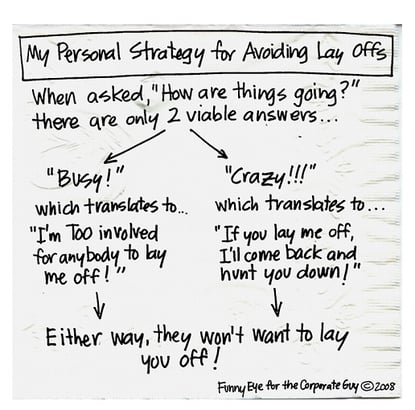What got me originally thinking about yesterday's Brainzooming column on career training when school’s out for you was a client request. She wanted ideas for assessing her organization’s marketing performance. I delivered a diagnostic from the files used by a high-priced marketing support organization my former employer belonged to for several years.
I realized during my corporate life there were incredible learning resources readily available all around, although they didn't necessarily look like learning resources. The exact moment I realized this was when we were investing a million dollars for a high-end consulting firm to help us create a strategic marketing plan. While many peers complained about all these Northwestern and Stanford MBAs trying to tell them what to do, I saw it as the company investing in helping us all become better strategic marketers.
Taking that view, I soaked up everything possible and even got them to bring in other resources to teach us including a guy whose only job was to help them think about how to logically structure presentations.
And yeah, I saved nearly everything and developed strategic thinking tools beyond what they provided. Many of those learning opportunities and resources (both excellent and crappy) were important early inspirations for creating our Brainzooming methodology.
16 Learning Resources for Everyday
If you take a similar, broad approach to the learning resources around you, I’m guessing you’ll find a lot of ways to keep learning and continually enhance your career training – even during times when typical training expenditures may be reduced.
Consider this list of 16 learning resources your employer may be dangling in front of you right now to improve your career training:
- Consultants and outside experts working on your business
- Training, webinars, and lunch-and-learn programs
- Working on new initiatives for the company
- Time with internal mentors
- Actively participating and using resources from industry association memberships
- Reference materials available within the business
- Opportunities to create your own reference materials
- Observing and asking questions of smart people
- Documenting learnings from projects and other work you do
- Experimenting and trying new work approaches
- Subscriptions - whether online, print, or some other form
- Attending events and conferences
- Volunteering to speak on behalf of the company at conferences
- Business travel
- Exposure to new technology
- Becoming great friends with smart and experienced colleagues
As you can tell, these 16 learning resources take on different forms. And the list doesn’t even include all the free and low-cost resource available online.
Redefining Career Training and Learning Resources
The point is, consider defining your job, at least in one respect, as an ongoing career training opportunity. When you do, your eyes open to a whole variety of learning opportunities you might have previously ignored.
So coupled with yesterday column, are you ready to start planning your career training for next semester? You have all summer to do it! – Mike Brown




